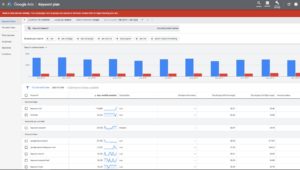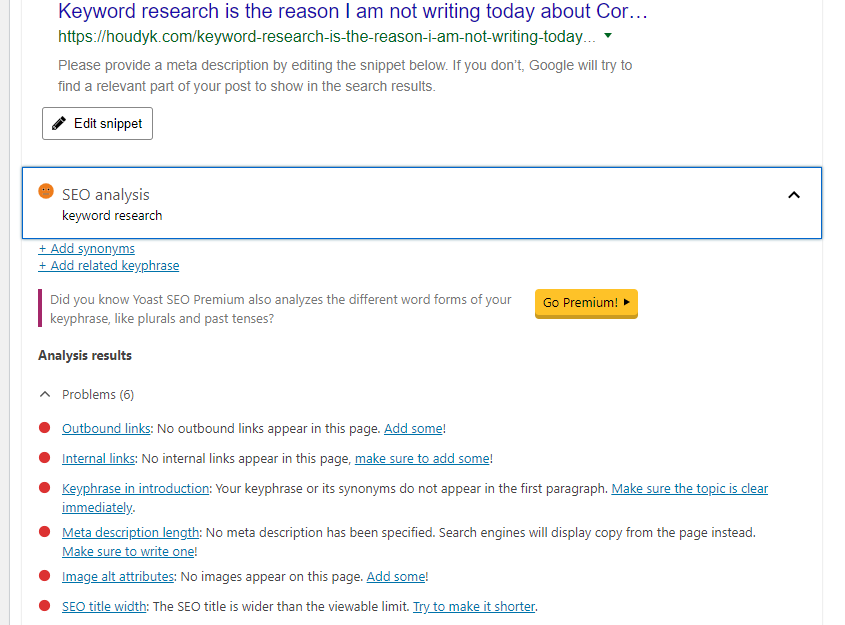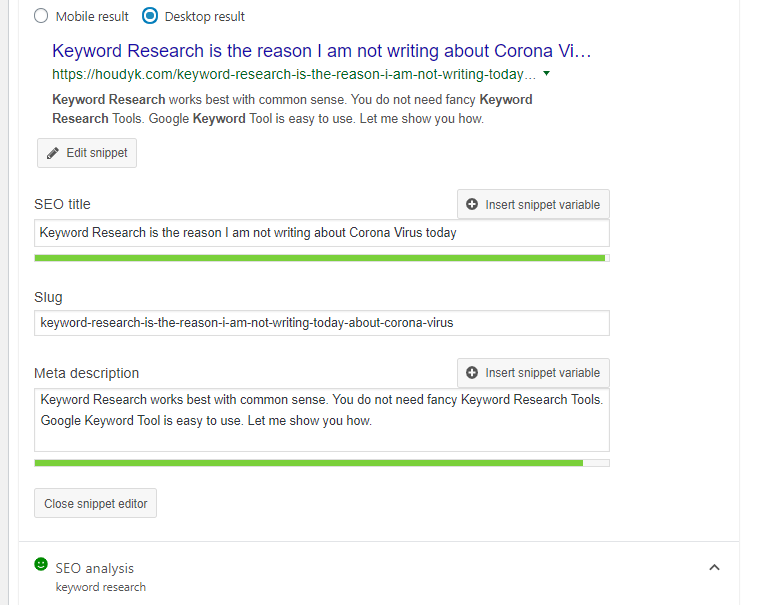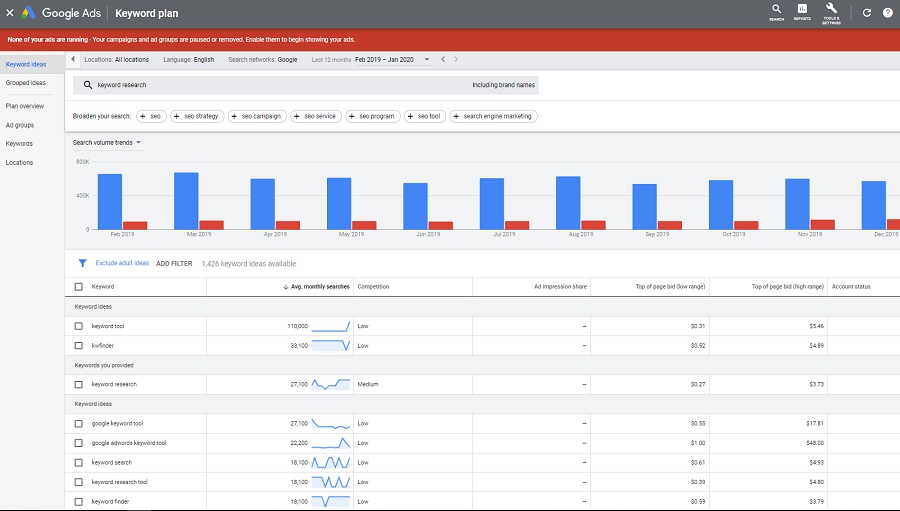On short term it might be interesting to use hot topics and actuality such as this years’ killer virus. But on the long run I think it is not interesting. Not for me. Proper keyword research is.
Next year you already forgot about this year’s threat and another disease is on top of people’s mind.
Before I will shine a light on my keyword research tactics, I do have to mention the use of the virus -with the Mexican beer name- I saw yesterday.
Yes, I refuse to mention it twice. Just a single use in the headline to get your attention, that is all.
Well, yesterday I received an email. A marketing e-mail I automatically deleted, but I recovered it from my bin, because I realized it is good to read some copy from other folks, so I scanned it briefly.
It was a sales letter to sell a rare coin subscription. The writer made the link between the virus panic and the gold price. It is directly related to golden coins. Now that makes sense.
For me to mention it here in relation with keyword research is just crap. Barely a reason for me to write this 200-word intro to today’s topic; Did you guess it? Keyword Research!
The basics of keyword research
Smart marketeers make you believe keyword research is a problem, and you need their solution for it.
To mention a few (I did not even do the research for this topic, ouch, but I am on a roll) Opteo, Wordstream, SEO-spider, ubersuggest, hrefs, and there is a ton more out there.
You do not need those for your keyword research. There are free and easy ways to do so.
Free Keyword Research tactics
1st of all. Your website statistics. Look at what people are looking for to find your website.
When I started my first SEO project back in 2007 I created a simple html page and threw it live on a generic keyword domain name. The searches people used to find my page, led to ideas for other topics related to the first one.
And the rest is history. Well, it became the number one portal in personal finance in The Netherlands. (That is an hollow expression, with no quantification whatsoever, but it sound nice.)
Only recently, a few years ago when I started paying for advertising, I realized the importance of keyword research.
Now I use it to increase the quality of both organic and paid traffic.
The second-best way to do keyword research and the best way if you must start from scratch is to use Google’s native keyword research tool.
All the fancy keyword research tools basically make a query in Google’s database and present it with shiny graphs. I must admit those are nice if you need to present reports to clients. But for personal use I yet must find the added value.
Now with that remark there are officially three distinctions between me and other marketers.
- I say no to funnel marketing. I believe you can convert enough prospects from cold to sale if you use the right words, to create a profitable business.
- I use off the shelf hardware, because most consumers use those too. No Apples for me.
- I get rid of more shininess and do not use keyword research tools; I prefer to analyse the data and interpret them myself. My reports are simple.
How does Google Native keyword research tool work?
Open google ads keyword research tool from your google ads interface. I think you can access certain functionality from outside, but I suggest you create an account if you do not have one yet, and use it from the inside.
You can start with keywords, or with a website or a specific page to pull in monthly search volumes. For this post I simply used the keyword: ‘keyword research’ technically that is a keyword phrase.
What I like most about this native Google Keyword Research tool?
IT IS FREE, so why pay for keyword tools? You tell me.

Keyword Tool Results
 The results of Google Adwords keyword tool look like this. I keep talking about AdWords because you keep searching for it. Stop doing that please. It is Google Ads now.
The results of Google Adwords keyword tool look like this. I keep talking about AdWords because you keep searching for it. Stop doing that please. It is Google Ads now.
The output generates a list of keywords with search volume and a bunch of other data such as competition.
Let’s have a look at just the monthly search volumes. Those are average monthly searches based on the previous twelve months. Results are for a specific language and geographic region. You can edit all those settings, they get pulled in according to your account defaults, so pay attention to that to make sure it is accurate for your purpose.
I looked for “keyword research” and found “keyword tool” to be the main query to go for. Wow! You really think keyword research is a problem and you need a tool for that!
Now I understand those marketers.
110.000 searches for “Keyword tool” every month is quite a lot. Give them what they want. Why not.
“Keyword research” comes in as a good second with 27.000 searches per month. If all of those come to read this post I am a happy dude so I will use it anyway as the main keyword for this post.
In my writing I use the following cycle
- Research
- Draft
- Craft
- Promote
Research
If a topic or (product) is new to me, I do some general research first, but keyword research is an important part of the research phase.
Draft
After the keyword research, I start drafting my text just hitting the keyboard hard with whatever comes in my mind. Depending on how deep I allow myself to go this can be very detailed, based on general research and keyword research.
Craft
Ideally, I let the piece rest for a few days and come back to it with a cleared mind. In the editing process I remove spelling mistakes, rewrite it to make it work better, and get the piece ready to publish.
Promote
Once the text is live comes the promotion phase. Either I let the SEO do its work with a little help sharing the text here and there. Or I used a paid promotion if that is justifiable. Evaluating the effectiveness of all of above is part of the research that makes the circle go round and round.
Keyword proof publishing with WordPress and Yoast SEO
Part of the publishing or crafting phase is writing the meta description. I use Yoast SEO for that, a WordPress plugin. It helps you see whether a specific focus keyword is optimized in the content, and you get suggestions on how to improve.
These suggestions involve the use in headline, url, alt tags, headings and the meta description itself.
With this post I go fast forward, and I will skip the crafting as I want it to go out pure and raw and I have some paid assignments waiting.
So I stop writing to take get the draft online and show you what Yoast SEO plugin can help you with.
OK.
It looks like this:

My post is far from perfect.
It does not include internal or external links. So here is an external one giving credit for Yoast SEO plugin. I have decided to be more generous with external links. You should do to. Let’s help each other a bit.
Now an internal one to to my contact page, because right now I can not think of a related post. Note that I added alt and title tags to the last link.

What else?
“Your keyphrase or its synonyms do not appear in the first paragraph. Make sure the topic is clear immediately.”
Ok, dealt with.
Next?
Yes, the meta description.
Alright. We have got a green smiley so we are good to go.

You can optimize your content for several keywords, but beware that you do not create internal competition on your own website. I think it is best if each post or page is about one topic.
My deviation here to an explanation about Yoast SEO plugin is not good in fact. I should stick to keyword research. But is is hard to stick to one topic sometimes. The exception confirms the rule I suppose.
So, that’s all folks. I gave a little insight in how to write an SEO proof blogpost using the free Google Ads Keyword Tool with WordPress and Yoast SEO plugin. Did I tell you all of those are free to use?
Now what do I want you to do?
A good post ends with a single clear call to action. This one not. Honestly I am not sure how to monetize the traffic on this blog. I know all the methods, but I am still thinking on how to do it in this case.
The other day I read a cool post and found myself looking for a subscription box to leave my email. Its is an option. But I do not want free riders in my mail list. I prefer to build a list with paying people.
So I am still thinking on that. Another purpose is acquisition of new clients via my website’s content. I am not sure how that is going to work out either. Probably directly approaching people works better. But if you want to hire me to help you with keyword research after reading this post don’t hesitate to ask!
If you read all the way to this line you might as well leave a reply below too. Try to convince me of using a fancy keyword research tool perhaps?

